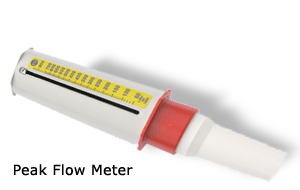Respiratory Diseases
2. Asthma
Asthma is a chronic condition which affects the respiratory system. It causes inflammation of the bronchioles, which in turn constricts them and makes it more difficult for air to pass through. Excessive amounts of mucus is also secreted which further blocks the bronchioles.

Symptoms
The typical symptoms are:
- Wheezing
- Cough
- Chest tightness
- Shortness of breath
Asthma triggers
Asthma symptoms flare up from time to time and there are certain things that may trigger asthma symptoms in a sufferer. Some of these triggers are listed below:
- Infections e.g. colds, coughs, chest infections.
- Irritants or allergens - substances which induce an allergic reaction such as house dust mite, pollen, perfumes
- Exercise – This can exacerbate asthma, nonetheless exercise is good for asthma sufferer. if necessary patients can use an inhaler before exercise to prevent symptoms from developing.
- Certain drugs – 1 in 50 people with asthma are allergic to aspirin
- Smoking and cigarette fumes
- Other fumes and chemicals - E.g. from paints, solvents and air pollution.
- Emotion - Stress, emotional upset, or laughing may trigger symptoms.
- Allergies to animals - Such as pet cats, dogs, and horses.
Controlling and treating asthma
Some patients use peak flow metres to keep an eye on how their lungs are performing. A peak flow meter is a small device that the patient blows into. It measures the rate of airflow that can be blown out of the lungs and records this in litres per minute. Patients record a pattern of peak flow over a period of weeks in the form of a graph. This helps them to understand when their airways are under stress and their peak flow is most affected. This can also go onto highlight any factors that may be triggering the asthma.

Doctors may also prescribe medicine in the form of inhalers to treat asthma. Some patients record their peak flow after using the inhaler to the see the effectiveness of the medication.
There are two main types of inhalers used to control asthma:
1. Preventers (anti inflamatories)
These need to be used every day for maximum benefit and act over a longer time by reducing the inflammation within the airways. With the correct dosage and type of preventive medicine there is little need for reliever medicines.
2. Relievers (bronchodilators)
These are fast acting medicines that relax (dilate) the muscles of the airways. They are used when an asthma attack has started. They open the airways making it easier to breathe. They are used to relieve symptoms.

